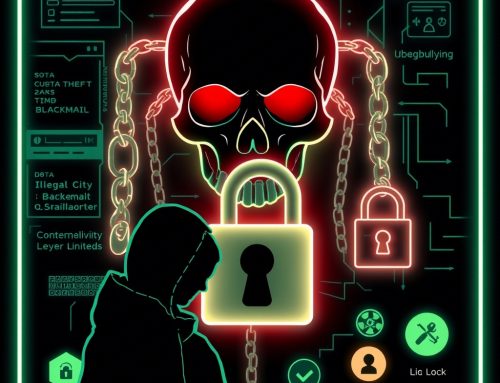Cybersecurity is the practice of protecting devices, networks, and sensitive information from cyber attacks, unauthorized access, and other forms of digital harm. As technology continues to advance and play a larger role in our lives, it’s important to take steps to protect ourselves and our personal information online.
I believe this is the best sample of how important cybersecurity is for kids.
Cybersecurity isn’t just for IT professionals or big corporations—it’s essential for everyone, including families. Protecting personal information and keeping your loved ones safe online starts at home. Cyber threats are constantly evolving, and understanding their importance is the first step toward prevention.
Here’s why cybersecurity matters for families and how you can get started with simple, practical steps.
The Value of Personal Information
Cybercriminals are always on the lookout for personal information that they can exploit for their gain. Data such as financial records, documents, and personal photos are all highly valuable. They can use this information for identity theft, financial fraud, or other malicious activities.
Think about the lists of passwords saved online, family vacation photos stored on your devices, or sensitive financial documents saved on a cloud platform. Without adequate protection, this data can easily fall into the wrong hands.
How to Protect Personal Info
- Use Strong Passwords: Create unique passwords for every account and consider using a password manager to keep track of them.
- Keep Software Updated: Always update your devices to the latest versions to protect against vulnerabilities.
- Be Careful About Sharing: Teach your family to think before sharing personal details online, especially on social media.
The Real Consequences of Cyber Attacks
Cyber attacks are more common and damaging than most people realize. From phishing scams and malware to ransomware, there’s no shortage of tactics cybercriminals can use to access your personal information. The consequences can range from identity theft and financial loss to, in rare cases, physical harm.
For example:
- Identity Theft: Hackers can impersonate you, open bank accounts in your name, or misuse your existing financial accounts.
- Financial Loss: Cybercriminals can drain savings accounts or make unauthorized purchases.
- Reputation Damage: Personal photos and information posted online without consent can impact your or your children’s reputation.
Education is key. Parents need to be aware of these risks and teach their children to recognize warning signs, such as phishing emails or malicious links.
Why Children Are Particularly Vulnerable
Children are often the easiest targets for cybercriminals because they may not understand online risks. Without guidance, they can fall prey to scams or overshare personal information.
For instance, a child could unknowingly download malware by clicking on an ad for a free game or responding to a message from a stranger in an online forum. The consequences can be devastating, exposing not just their devices but the entire family’s network to potential threats.
How to Teach Children Online Safety
- Monitor Online Activity: Supervise your child’s internet habits, especially when they’re young.
- Set Boundaries: Limit screen time and restrict access to certain sites or applications.
- Provide Guidance: Teach kids about safe browsing habits, such as avoiding suspicious links and not sharing personal information.
Cybersecurity in Education and Professional Life
The importance of cybersecurity extends far beyond personal life. Schools and workplaces increasingly rely on technology, and cyber threats exist in these environments, too. Whether your child is submitting homework via an online portal or looking to join the workforce in a tech-powered industry, understanding cybersecurity is essential.
By equipping children with knowledge now, you’re not just protecting their current activities, but also preparing them for challenges they’ll face throughout their careers.
Practical Tips:
- Educate children on secure file-sharing practices and how to recognize phishing attempts.
- Encourage the use of secure platforms approved by schools and workplaces.
- Teach them why cybersecurity policies exist and how to follow them.
Cybersecurity Starts with the Family
Cybersecurity isn’t just an individual responsibility—it’s a family affair. By making it a shared priority, everyone can contribute to a safer online environment.
Lead by Example:
- Practice Good Habits: Use strong passwords, update your devices regularly, and avoid questionable links.
- Have Regular Discussions: Talk openly about cybersecurity with your family, making it a part of normal conversations.
- Create a Plan: Develop a family plan for handling potential security breaches, like what to do if an account gets hacked.
When every member of the family is informed and engaged, it becomes much easier to protect everyone.
Stay Updated, Stay Safe
The world of cybersecurity changes quickly. New threats emerge daily, and it’s crucial to stay ahead. Regular updates, learning about the latest threats, and using reliable security software can go a long way in protecting your family.
Steps to Stay Updated:
- Follow Reputable News Sources: Subscribe to cybersecurity blogs or newsletters.
- Update Regularly: Keep all software, devices, and applications up to date to avoid vulnerabilities.
- Review Policies Periodically: Check security settings on your devices and services often to ensure they meet the latest safety standards.
An Investment that Pays Off
Consider this—a little time and money invested in cybersecurity today can save you from the significant financial and emotional costs of a security breach tomorrow. The cleanup process after an incident is often more time-consuming and expensive than taking steps to prevent it in the first place.
Some simple proactive measures include:
- Installing antivirus software.
- Using two-factor authentication.
- Backup important files regularly to prevent data loss.
The peace of mind that comes from knowing your family’s online presence is secure is priceless.
Final Thoughts
Cybersecurity in today’s digital landscape is non-negotiable. Parents play an essential role in equipping their families with the skills and tools to stay safe online. Whether it’s protecting personal information, educating children about online risks, or staying updated on emerging threats, the responsibility starts at home.
By fostering awareness and good habits, you can safeguard your family from the growing dangers of cyber threats—and ensure that technology enhances, rather than compromises, your loved ones’ lives.





